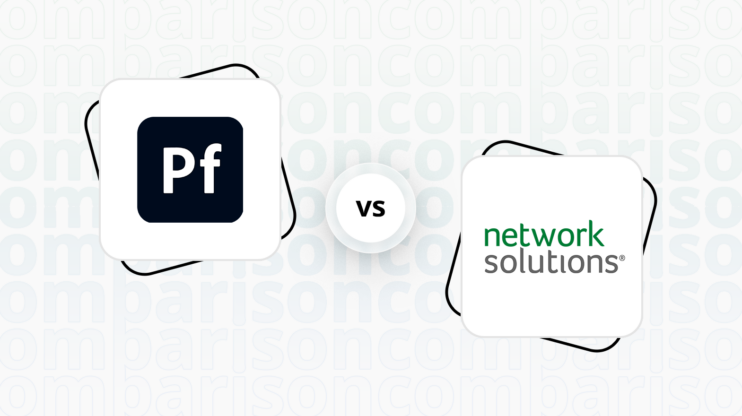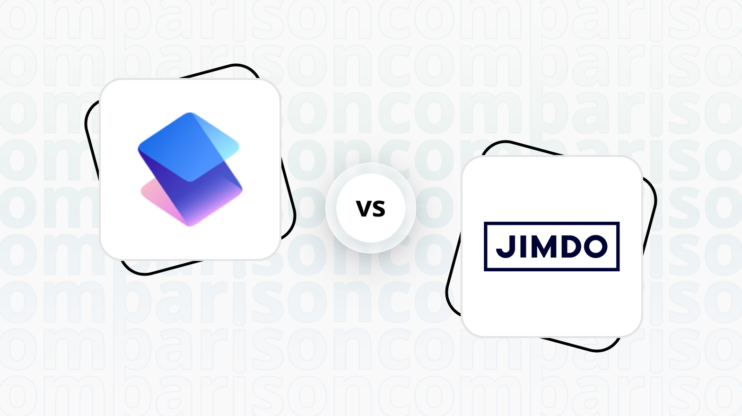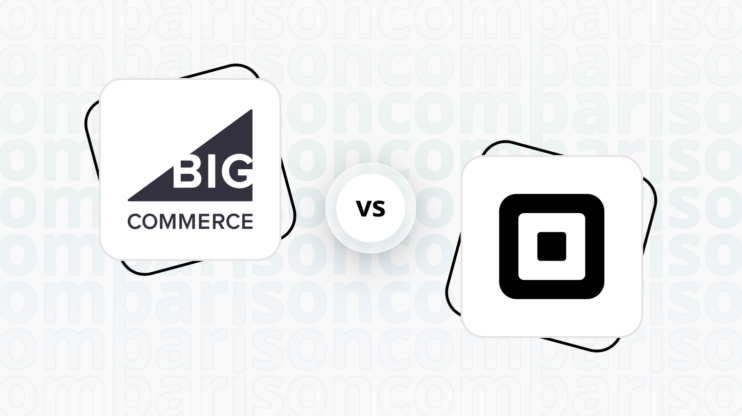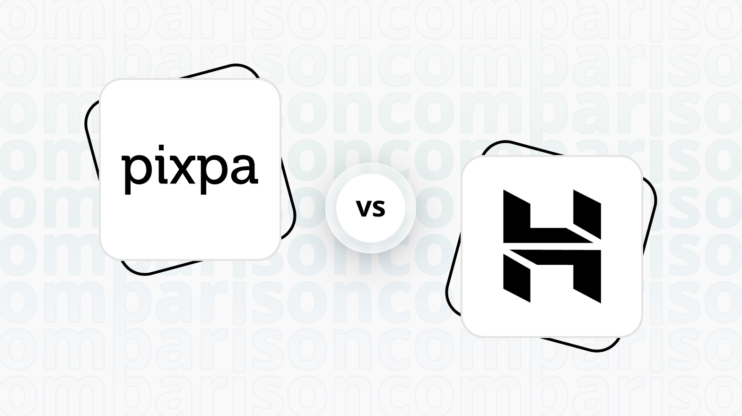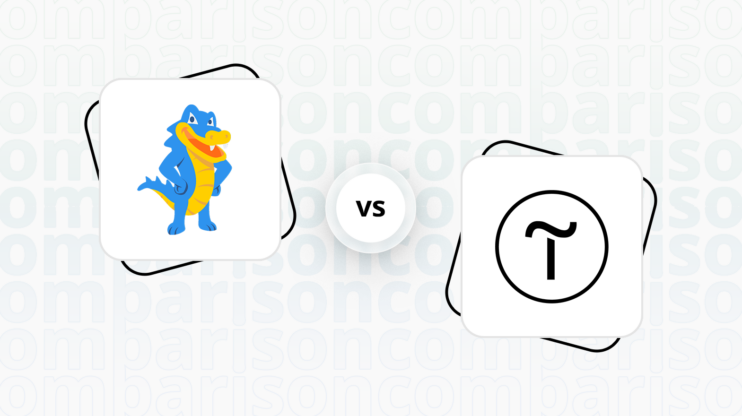Final verdict
Showit and Webnode both offer unique strengths, catering to different user needs and preferences.
-
Showit (Overall Grade: 6.4/10)
is ideal for creative professionals such as photographers, designers, and bloggers who prioritize design flexibility and customization. Its dual canvas interface allows for independent design of mobile and desktop views, providing a high degree of control over the website’s appearance. Showit integrates seamlessly with WordPress for blogging, making it a popular choice for users who want the design flexibility of Showit with the powerful blogging capabilities of WordPress. However, its ecommerce capabilities are limited compared to other platforms. -
Webnode (Overall Grade: 6.5/10)
is a user-friendly website builder suitable for beginners who want to create a simple website quickly and easily. It offers a variety of customizable templates and responsive designs, making it a good option for various website types, including business, portfolios, and personal sites. Webnode provides more comprehensive ecommerce features than Showit, including an online store builder, product management tools, and various payment options. However, it may lack the advanced customization and flexibility that more experienced users might require.

|

|
|
|---|---|---|
|
Design functionalities & templates |
8.5 |
7.1 |
|
Ease of use |
8.6 |
8.0 |
|
Ecommerce |
4.8 |
6.3 |
|
Website Editors |
8.0 |
7.3 |
|
Product testing options |
8.3 |
5.3 |
|
Price |
7.9 |
7.7 |
|
Hosting quality |
7.3 |
6.3 |
|
Website speed optimization |
5.4 |
6.1 |
|
Plugins and integrations |
5.8 |
6.8 |
|
Marketing features |
7.2 |
5.5 |
|
Customer support |
6.4 |
5.3 |
|
Security |
8.3 |
7.7 |
|
AI capabilities |
0 |
5.3 |
|
User Management |
6.7 |
6.9 |
| Overall |
6.4 |
6.5 |
Best for ecommerce
 4.8
4.8
 6.3
6.3
Verdict
: Showit is ideal for creative professionals needing basic ecommerce features, while Webnode offers more comprehensive ecommerce tools suitable for small to medium-sized online stores.
-
Showit
: Showit is primarily a design-focused platform, making it perfect for visually oriented websites. It offers basic ecommerce capabilities through integrations with platforms like WooCommerce and Shopify. However, when comparing Showit vs Webnode, Showit lacks the comprehensive ecommerce features needed for larger online stores. -
Webnode
: Webnode provides a more robust set of ecommerce tools, including an online store builder, various payment options, and basic analytics. It is a good option for beginners and small to medium-sized businesses looking for a straightforward ecommerce solution. However, it may have limitations in customization and scalability for larger enterprises.
Best for informational & business websites
 8.7
8.7
 7.2
7.2
Verdict
: Showit is the superior choice for informational and business websites, offering greater customization and design flexibility, while Webnode is a solid option for beginners seeking simplicity and ease of use.
-
Showit
: Showit scores 8.7 for informational and business websites, making it an excellent choice for creative professionals who need a high degree of customization. Its drag-and-drop interface and dual canvas design allow for independent mobile and desktop views, providing a unique level of control over the website’s appearance. The integration with WordPress for blogging further enhances its capabilities, making it a versatile platform for those who want both design flexibility and powerful blogging features. -
Webnode
: Webnode, with a score of 7.2, is a good option for beginners who want to create a simple website quickly and easily. Its drag-and-drop interface and customizable templates make it user-friendly, though it lacks the advanced design capabilities of Showit. Webnode offers free plans with limitations, but its paid plans provide more storage, custom domain names, and the ability to remove ads, making it a practical choice for those who prioritize ease of use over extensive customization. When comparing Showit vs Webnode, Webnode is ideal for users who need a straightforward, no-fuss website builder.
Detailed comparison
Design functionalities & templates
Design FunctionalitiesRepresents how well each platform allows for creative design and customization of websites.Score Components:
- Template Variety (30%): Range and quality of design templates.
- Customization (30%): Flexibility and options for design alterations.
- User Interface (20%): Ease and intuitiveness of the design process.
- Responsiveness (10%): Adaptability to different devices and screen sizes.
- Innovation (10%): Unique design features and tools.
 8.5
8.5
 7.1
7.1
🏆
Winner: Showit.
Showit offers a wider variety of templates and designs, greater customization flexibility, and more creative design possibilities.
Showit offers a wide variety of templates and designs, catering to diverse aesthetic preferences and business needs. Users can choose from an extensive collection that ranges from minimalist and sleek to bold and artistic, ensuring there’s something for every brand identity.
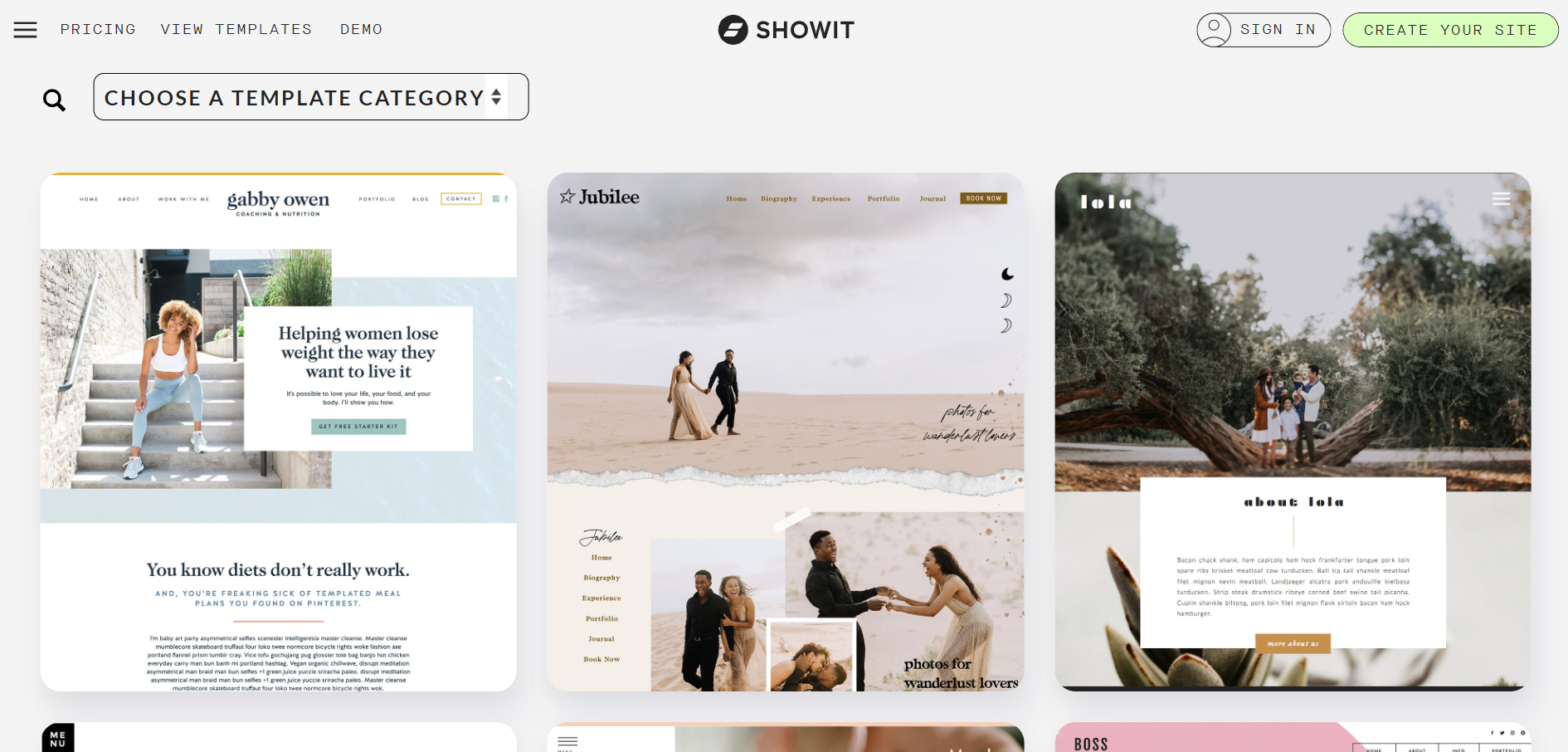

On the other hand, Webnode offers a variety of website templates designed for different purposes, from business and portfolios to restaurants and travel. These templates are customizable and responsive, ensuring they display well on any device.
Get a head start on website creation with AI
Create a custom website tailored to your business needs 10X faster with 10Web AI Website Builder!
Ease of use
Ease of useReflects the platform’s overall user-friendliness.Score
Components:
- Learning curve (40%): Quickness and ease of getting started.
- Interface design (30%): Simplicity and intuitiveness of layout.
- User guidance (20%): Quality of tutorials and support.
- Flexibility (10%): Adaptability to various user skills.
 8.6
8.6
 8.0
8.0
🏆 Winner: Showit
. Scoring 8.6, Showit is a highly user-friendly website builder, designed with a drag-and-drop interface that makes it easy for users to create custom websites without needing any coding knowledge. Webnode, with a score of 8.0, offers a straightforward interface and drag-and-drop functionality suitable for beginners without coding experience. However, Showit’s high degree of customization and flexibility in design gives it an edge over Webnode.
Learning Resources
🏆 Winner: Showit
. Showit offers a comprehensive training course and a private Facebook group for community advice and peer support, catering to different learning styles and ensuring users can effectively navigate and utilize the platform. Webnode, on the other hand, offers a variety of learning resources and support channels, but lacks a large community of users across various platforms.
For ecommerce
EcommerceMeasures the platform’s effectiveness in supporting online business activities.Score Components:
- Ecommerce themes and templates (20%): Variety and design of templates.
- Product management (25%): Ease of managing and organizing products.
- Payment options (25%): Variety and convenience of payment methods.
- Ecommerce features (20%): Features for managing an ecommerce store.
- Integration (10%): Compatibility with external e-commerce tools and services.
 4.8
4.8
 6.3
6.3
Showit and Webnode offer different ecommerce capabilities, with Showit focusing more on design and Webnode providing a more comprehensive set of ecommerce features.

|

|
|
|---|---|---|
|
Ecommerce themes and templates |
2.0 |
6.5 |
|
Product page customization |
2.5 |
7.0 |
|
Payment processing and commissions |
4.0 |
6.8 |
|
POS capabilities |
1.0 |
4.0 |
|
Payment gateways |
4.5 |
7.0 |
|
Product numbers |
3.0 |
5.5 |
|
Additional ecommerce features |
3.5 |
6.0 |
Showit ecommerce features:
Showit is primarily a website builder focused on design, offering great flexibility and creative freedom, making it ideal for visually oriented websites rather than extensive e-commerce platforms. It includes basic ecommerce functions but lacks the comprehensive ecommerce features found in platforms like Shopify or WooCommerce, however Showit allows integration of both the mentioned platforms for enhancing ecommerce capabilities.
Webnode ecommerce features:
Webnode’s e-commerce features include an online store builder, product management tools, various payment options, and basic analytics. However, users may find its customization options limited compared to other platforms, and transaction fees could impact profitability. Integration capabilities may also be constrained, and scalability might be a concern for larger businesses. Careful consideration of specific business needs is recommended before choosing Webnode for e-commerce purposes.
Ecommerce themes & templates
Showit does not have any ecommerce specific templates. On the other hand, Webnode offers ecommerce-specific templates designed for creating online stores, though the exact number of templates available may vary over time. These templates typically come with features such as product showcasing, shopping cart functionality, support for various payment gateways, and customization options. However, users should be mindful of potential limitations such as customization restrictions, feature limitations based on plan tiers, transaction fees, and integration limitations when choosing a template and plan for their ecommerce website on Webnode.
Product page customization
Showit has very basic ecommerce capabilities, primarily through its integration with WooCommerce and Shopify. Webnode provides users with extensive customization options for product pages, allowing for the creation of visually appealing and informative displays. Through customizable content blocks, product images and galleries, and tailored product descriptions, users can effectively showcase their products. Additionally, features such as customizable call-to-action buttons, product variations, and SEO optimization contribute to a seamless and optimized shopping experience.
Payment processing
Showit supports e-commerce by allowing integration with third-party platforms like Shopify Lite, ThriveCart, WooCommerce, and Podia, rather than offering direct payment processing or POS capabilities. Users can add e-commerce functionalities to their Showit sites using embed codes for “Buy Buttons” or similar features from these platforms. The choice of platform depends on the user’s specific needs, including product type, store size, and budget, as each platform has its own pricing and transaction fee structures. Additionally the platform supports integration of PayPal pay button, allowing users to pay directly through their PayPal account.
Webnode website builder supports various payment gateways, including popular options like PayPal and Stripe, for online transactions. While Webnode itself doesn’t charge commissions on transactions, payment gateways may have their own fee structures. Webnode primarily focuses on facilitating online transactions and doesn’t provide native POS capabilities, although integration with third-party POS solutions may be possible. For the latest information on supported payment gateways, transaction fees, and POS integrations, users should refer to Webnode’s official documentation or contact their customer support.
Website Editors
Website EditorsEvaluates the platforms’ website building and editing capabilities.Score Components:
- Customization tools (40%): Range and power of editing features.
- Editor usability (30%): User experience within the editor.
- Design flexibility (20%): Freedom in layout and design changes.
- Update and maintenance ease (10%): Simplicity of updating and maintaining the site.
 8.0
8.0
 7.3
7.3
🏆
Winner: Showit
. Showit, with a score of 8.0, is designed for creating custom, responsive websites with a focus on ease of use, especially for photographers and creative professionals. It allows users to design their website visually with a drag-and-drop interface, eliminating the need for coding knowledge. Users can create highly customized pages by adjusting layouts, fonts, and colors, and can also incorporate multimedia elements like videos and images directly into their designs. Additionally, Showit offers deep integration with WordPress for blogging, enabling users to manage and publish blog posts within the same platform, providing a seamless experience from website design to content management.
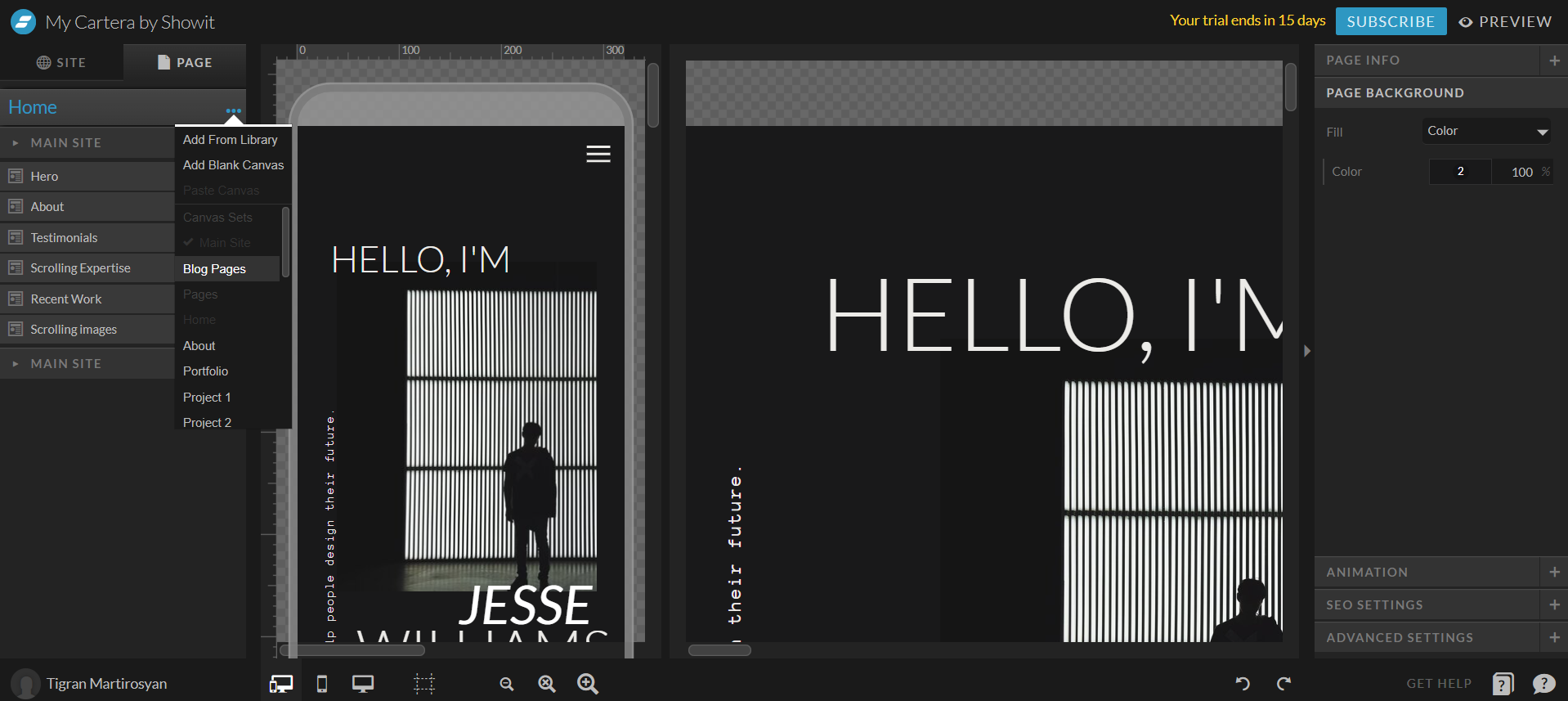
Webnode’s website builder, scoring 7.3, features a user-friendly drag-and-drop interface with customizable templates, enabling users to easily create professional-looking websites without coding skills. The editor offers responsive design capabilities and multilingual support, catering to diverse audiences across different devices and languages. Built-in features such as SEO tools, e-commerce functionality, and analytics integration empower users to optimize their websites for search engines, sell products online, and track performance metrics effectively. Overall, Webnode provides a comprehensive solution for individuals and businesses to create and manage their online presence efficiently.
Mobile editor/app
 0
0
 5.5
5.5

🏆
Winner: Webnode
. Both Showit and Webnode do not offer a dedicated mobile editor app. However, Webnode allows users to edit their website using the mobile browser version of the editor, albeit with certain limitations. This gives Webnode an edge over Showit, which does not support editing via a mobile browser.
Showit’s unique feature is its dual canvas interface, which allows for the independent design of mobile and desktop views, providing a high degree of customization and control over the website’s appearance on different devices. However, this feature is not accessible on mobile devices, as Showit does not support mobile editing.
Webnode, on the other hand, while not offering a dedicated mobile app, does allow for some level of mobile editing through the browser version of their editor. This provides users with the flexibility to make changes to their website on the go, even if the functionality is somewhat limited compared to the desktop version.
In summary, while neither platform offers a robust mobile editing experience, Webnode comes out ahead due to its support for mobile browser editing.
Product testing options
Product Testing OptionsAssesses the options for trying out platform features before commitment.Score Components:
- Trial quality (40%): Extent and usefulness of the trial or free version.
- Feature accessibility (30%): How many features are available to test.
- Trial duration (20%): Length of the trial period.
- Ease of transition (10%): Smoothness of moving from trial to paid plans.
 8.3
8.3
 5.3
5.3
Overall Result
:
Showit Wins
. Showit scores 8.3 in product testing options, significantly higher than Webnode’s 5.3. Showit offers a 14-day free trial during which all premium features can be tested, and also provides a 30-day money back guarantee. Webnode, on the other hand, offers a free plan with some features available for testing, but does not provide a trial version and only offers a 15-day money back guarantee.

|

|
|
|---|---|---|
|
Free Plan |
No (14-day free trial) |
Yes |
|
Trial Duration |
14 days | No trial version |
|
Testing Premium Features |
All features during free trial |
Some features with the free plan |
|
Money Back Guarantee |
30 days |
15 days |
Price
PriceLooks at the cost-effectiveness and value for money of each platform.Score Components:
- Plan value (40%): What each pricing tier offers.
- Transparency and clarity (30%): Clearness of pricing structures.
- Flexibility of plans (20%): Range of options to suit different budgets.
- Hidden costs (10%): Additional expenses not included in the plan.
 7.9
7.9
 7.7
7.7
Showit and Webnode have similar price scores, with Showit slightly leading.
Showit offers a range of plans for different needs, including a custom plan for high-traffic blogs. Webnode, on the other hand, offers a variety of plans but lacks an enterprise plan. Both platforms offer discounts on annual billing.

|

|
|
|---|---|---|
|
$0-$10 |
No offering at this amount. |
LIMITED ($5.50/month): Basic plan, 200 MB storage, attach domain, website statistics, up to 5 form fields, last 30 days backup. This plan allows to manage 1 website with unlimited number of pages. Value for price: 3.0 |
|
$15-$25 |
No offering at this amount. |
MINI ($10.00/month): All essentials for a simple website, 1 GB storage, 3 GB bandwidth, website statistics, 1 email account. This plan allows to manage 1 website with unlimited number of pages. Value for price: 4.5 |
|
$25-$30 |
Showit ($24/month): Ideal for sites without a blog. Includes 20GB storage and secure certificate. Regular design backups stored for 7 days. Value for price: 6.0 |
STANDARD ($16.90/month): For starting an online store, 3 GB storage, 10 GB bandwidth, 20 email accounts, basic store features. This plan allows to manage 1 website with unlimited number of pages. Value for price: 6.0 |
|
$30-$40 |
Showit + Basic Starter Blog ($29/month): For new blogs. Includes everything in the Showit plan, plus blog-specific features. 20GB storage, up to 10k monthly visitors, daily backups stored for 30 days, pre-installed plugins (no additional plugins are permitted), 1 WordPress user. Value for price: 7.0 |
PROFI ($26.50/month): Professional websites, 7 GB storage, unlimited bandwidth, 100 email accounts, full online store capabilities. This plan allows to manage 1 website with unlimited number of pages. Value for price: 7.5 |
|
$60-$70 |
Showit + Advanced Blog ($39/month): For migrating or high-traffic blogs with custom plugin needs. Includes everything in the Basic Starter Blog plan, plus up to 25k monthly visits, unlimited number of plugins, unlimited number of WordPress users, Free advanced blog migration from WordPress or Squarespace and FTP access. Value for price: 8.0 |
BUSINESS ($34.90/month): Comprehensive e-commerce, 15 GB storage, unlimited bandwidth, 1000 email accounts, advanced online store features. This plan allows to manage 1 website with unlimited number of pages. Value for price: 8.5 |
|
$100+ |
Showit + Advanced Blog 50k ($69/month): Includes everything in the Showit + Advanced Blog plan, with possibility to install custom WordPress plugins, 30 GB storage, up to 50k visitors monthly, and possibility to migrate Squarespace and WordPress blog posts. Value for price: 8.5 |
No offering at this amount. |
location. As a result in rare cases the prices displayed here can differ from the ones you see on their
websites.
Hosting quality
Hosting
qualityExamines the reliability and performance of the hosting solutions.Score Components:
- Uptime (40%): Consistency and reliability of website availability.
- Speed (30%): Loading times and performance.
- Bandwidth and storage (20%): Sufficiency of resources provided.
- Data centers (10%): Quality and distribution of hosting infrastructure.
 7.3
7.3
 6.3
6.3
🏆
Winner: Showit
Showit offers managed WordPress hosting with a 99.9% uptime guarantee and daily backups. Webnode, on the other hand, does not disclose its hosting type or data center locations, and does not offer an uptime guarantee. Despite this, it does offer automated backups on higher plans. Showit’s transparency and superior uptime guarantee give it the edge in this category.

|

|
|
|---|---|---|
|
Do they offer hosting? |
Yes, Managed wordpress hosting, with daily backups and 20GB storage. |
Yes, with from 1GB to unlimited bandwidth and automated backups on higher plans |
|
Data Centers: |
Not disclosed |
Not disclosed |
|
Type of hosting: |
Managed WordPress hosting |
Not disclosed |
|
Uptime: |
99.9% |
99.6% |
|
Uptime Guarantee: |
Yes, 99% |
No |
Website Speed Optimization
Website Speed OptimizationEvaluates optimization of website loading timesScore Components:
- PageSpeed Score (30%): Google’s score indicating performance optimization.
- Loading Time (30%): The average time until a website is fully interactive.
- Mobile Optimization (15%): Optimization effectiveness for mobile devices.
- Resource Optimization (15%): Optimizing images, scripts, and other heavy resources.
- CDN Usage (10%): Use of CDN to enhance speed across geolocations.
 5.4
5.4
 6.1
6.1
🏆 Winner: Webnode
Both Showit and Webnode have strategies in place for website speed optimization, but Webnode has a slightly higher score in this area.

|

|
|
|---|---|---|
|
Focus |
Optimization plugins, Caching |
Code Minification, Image Optimization, Caching |
|
Performance Tools |
Not specified |
Not specified |
|
Key Strategies |
Optimization plugins, Caching |
Code Minification, Image Optimization, Caching |
|
Load Times |
Varies depending on optimization and website complexity |
Varies depending on optimization |
|
Page Speed Scores Range |
Not specified |
Not specified |
|
Core Web Vitals Improvement |
Not disclosed |
Not provided |
Showit, a drag-and-drop website builder, focuses on optimization plugins and caching for speed optimization. However, the load times and PageSpeed scores vary depending on the optimization and website complexity. Showit does not disclose any information on their Core Web Vitals improvements.
On the other hand, Webnode, a website builder that uses a drag-and-drop interface, employs strategies such as code minification, image optimization, and caching for speed optimization. The load times and PageSpeed scores also vary depending on the optimization. Webnode does not provide any information on their Core Web Vitals improvements. Despite the lack of specific data, Webnode has a slightly higher website speed optimization score than Showit, making it the winner in this category.
Get a head start on website creation with AI
Create a custom website tailored to your business needs 10X faster with 10Web AI Website Builder!
Plugins and integrations
Plugins and integrationsMeasures the range and effectiveness of additional plugins and integrations.Score Components:
- Variety of options (40%): Range of available add-ons.
- Integration smoothness (30%): Ease of integrating plugins into the site.
- Quality of plugins (20%): Functionality and reliability of the options.
- Custom integration capabilities (10%): Support for custom or third-party integrations.
 5.8
5.8
 6.8
6.8
🏆 Winner: Webnode.
With a score of 6.8, Webnode takes the lead over Showit, which scores 5.8. Webnode’s strength lies in its partnership with Elfsight, offering over 70 plugins that cover a wide range of applications including social media, reviews, e-commerce, chats, and forms. Showit, on the other hand, offers a variety of plugins primarily for users with the Advanced Blog plan, enhancing website functionality across SEO, spam protection, and more. However, the availability and use of these plugins are contingent upon the subscription tier, with higher tiers required for broader plugin compatibility and additional features. Notably, compatibility issues exist with certain WordPress plugins, necessitating alternative solutions or adjustments for optimal functionality.

Marketing Features
Design FunctionalitiesRepresents how well each platform allows for creative design and customization of websites.Score Components:
- Template Variety (30%): Range and quality of design templates.
- Customization (30%): Flexibility and options for design alterations.
- User Interface (20%): Ease and intuitiveness of the design process.
- Responsiveness (10%): Adaptability to different devices and screen sizes.
- Innovation (10%): Unique design features and tools.
 7.2
7.2
 5.5
5.5
🏆
Overall Winner: Showit
. Showit stands out for its extensive third-party integrations for email marketing and analytics, as well as its unique dual canvas interface for independent design of mobile and desktop views. Webnode, while offering a good range of features, falls short in its in-depth analytics and email marketing capabilities.

|

|
|
|---|---|---|
|
SEO Tools |
|
|
|
Email Marketing |
✓ (through third-party integrations) |
|
|
Blogging |
|
|
|
Social Media Integration |
|
✓ (through third party integration) |
|
Analytics and Reporting |
✓ (through integration of Google Analytics) |
|
|
Ads and Promotions |
✓ (through third-party integrations) |
|
Customer Support
Customer supportEvaluates the quality and availability of support options.Score Components:
- Response time (40%): Speed of support responses.
- Support quality (30%): Effectiveness and helpfulness of the support.
- Availability (20%): Range of support channels (phone, chat, email).
- Resource richness (10%): Quality of self-help and educational materials.
 6.4
6.4
 5.3
5.3
🏆 Winner: Showit
. Comparing Showit vs Webnode, Showit takes the lead in this category with a customer support score of 6.4. Showit offers email support from Monday to Friday, 7 AM to 11 PM Arizona Time, with a typical response time of 1-2 hours during business hours. Additionally, Showit provides chat support for more immediate assistance during these hours and has limited support coverage on weekends.
Webnode, on the other hand, has a customer support score of 5.3. It offers support in more than 20 languages, available five days a week, primarily through email with a 24-hour response time. Premium customers receive priority phone support, but phone and live chat support are generally not available. Webnode’s support operates only during weekdays, which may be a limitation for users needing assistance outside these hours.
Overall, Showit’s more responsive and accessible support options make it the better choice for users seeking reliable customer service.
Security
SecurityLooks at the platforms’ security measures and data protection.Score Components:
- Data protection (40%): Safeguards for user and customer data.
- SSL and encryption (30%): Implementation of secure connections.
- Compliance (20%): Adherence to industry security standards.
- Regular updates (10%): Frequency of security updates and patches.
 8.3
8.3
 7.7
7.7
🏆
Winner: Showit
. Showit takes the lead in security with a score of 8.3, compared to Webnode’s 7.7. Showit prioritizes user data privacy and security, adhering to GDPR guidelines and employing Amazon’s S3 for secure and redundant data storage. It also provides robust security features for all hosted websites, including free SSL certificates for secure HTTPS connections and automated backups.
Webnode, on the other hand, offers a variety of features for building and managing websites, including customizable templates, membership registration options, and GDPR compliance tools. It also provides a variety of security measures for websites, including a Premium Site Security add-on with IP Filters, Form Protection, and Malware Scanning for users with a Premium Plan. However, it falls slightly short in comparison to Showit’s comprehensive security measures.
AI Capabilities
AI capabilitiesMeasures the effectiveness of AI-driven features and tools.Score Components:
- Automation efficiency (40%): Impact of AI on streamlining processes.
- Personalization (30%): AI-driven customization for users or customers.
- AI-Assisted design (20%): Role of AI in website design and functionality.
- Data analysis (10%): Use of AI in interpreting user data and analytics.
 0
0
 5.3
5.3

|

|
|
|---|---|---|
|
AI Builder |
|
Webnode AI builder streamlines the website creation process |
|
AI Ecommerce features |
|
|
|
AI content generation |
|
|
|
Additional AI features |
|
|
🏆 Winner: Webnode
. Webnode, with a score of 5.3, has an AI builder that helps streamline the website creation process. The AI builder generates a custom website that aligns with the user’s needs, including creating text content and sourcing relevant images. This makes Webnode a user-friendly platform that offers a simple and engaging approach to website building.
Showit, on the other hand, does not have any AI capabilities. This makes it less versatile compared to Webnode in terms of website creation and management.
User Management
User ManagementAssesses the platforms’ capabilities in managing user roles, permissions, and accessibility.Score Components:
- Role Customization (40%): Flexibility in creating and defining user roles and
permissions. - Ease of Management (30%): User interface and tools for managing users.
- Access Control (20%): Effectiveness of access control measures for different user
levels. - Scalability (10%): Ability to manage a growing number of users efficiently.
 6.7
6.7
 6.9
6.9
🏆 Winner: Webnode
. Both Showit and Webnode offer different user roles and access levels, but Webnode slightly edges out Showit in terms of user management capabilities.
- Showit allows only one user on lower plans, on its Showit + Advanced Blog plan the platform allows an unlimited number of users with different access levels.
- Webnode allows multiple users to manage and edit a website, but the exact number varies depending on the subscription plan you choose. The free version of Webnode provides limited user access for management and editing, while premium plans offer more flexibility, including the ability to add multiple users with different roles and permissions.
Showit User Roles and Access Levels:
| Role | Description | Access Highlights |
|---|---|---|
| Administrator | Users with full access to all administration features, including Elementor settings. | Can edit all content, Access to Elementor settings, Can install plugins and themes, Can manage users |
| Editor | Users who can manage and publish content including pages and posts. | Can edit pages/posts created with Elementor, Cannot access Elementor settings, Can manage categories, tags, and links, Can moderate comments |
| Author | Users who can publish and manage their own posts. | Can create posts with Elementor, Cannot edit pages, Limited access to media library, Cannot access Elementor settings |
| Contributor | Users who can write and manage their own posts but cannot publish them. | Can create content with Elementor, Cannot publish or edit pages, No access to Elementor settings, Submissions require review by higher-level roles |
Webnode User Roles and Access Levels:
| Role | Description | Access Highlights |
|---|---|---|
| Website Owner | The individual or entity that owns the Webnode website. | Full access: can modify site structure, design, content, and manage user roles. |
| Administrator | Users with administrative privileges assigned by the website owner. | Nearly full access, including content management, and some settings adjustments. |
| Editor | Users tasked with creating, editing, and publishing content. | Access to add and edit content, blog posts, and pages, but cannot alter design. |
| Contributor | Users who can contribute content but cannot publish it. | Can draft content but need approval from an Editor or Administrator to publish. |
| Viewer/Visitor | Individuals who visit the website without any editing permissions. | Can view the public website and interact through comments or contact forms. |
| E-commerce Manager | Specifically for websites with an e-commerce component, managing products. | Can add, edit, and manage products, orders, and customer interactions. |
Additional Features

|

|
|
|---|---|---|
|
SSL Certificate |
|
|
|
Custom Domain |
|
|
|
Free Custom Domain Included |
|
|
|
International Domains |
|
|
|
Mobile Responsive |
|
|
|
Page Speed |
|
|
|
Website Builder Mobile App |
|
|
|
Convert a Website To An App |
|
|
|
Website Analytics |
|
|
|
Multilingual Sites |
|
|
|
Multiple Users |
|
|
User Feedback
Showit is a drag-and-drop website builder designed primarily for creative professionals such as photographers, designers, and bloggers. It offers users the ability to create custom, mobile-responsive websites without needing to write code. Showit’s unique feature is its dual canvas interface, which allows for the independent design of mobile and desktop views, providing a high degree of customization and control over the website’s appearance on different devices. The platform integrates seamlessly with WordPress for blogging, making it a popular choice for users who want the design flexibility of Showit for their site’s look and feel, with the powerful blogging capabilities of WordPress.
User feedback on Webnode highlights its ease of use, rapid website creation capabilities, and the wide range of templates available, making it a popular choice for individuals and businesses seeking an intuitive web development platform. While praised for its user-friendly interface and quick setup, including domain purchase and application, some users express a desire for more flexibility and customization options, especially in themes and e-commerce features. Comparatively, it falls short on advanced functionalities such as SEO tools and widgets offered by competitors like WordPress. Customer service experiences vary, with some users facing challenges in getting support for email hosting and analytics integration. Overall, Webnode is celebrated for its ability to accommodate users with little to no coding knowledge, offering an accessible solution for creating professional websites, though it may not fully meet the needs of those requiring more complex site features or dedicated customer support.
The making of this blog
We followed a clear, step-by-step process to write and research this article.
FAQ
Which platform is better for creative professionals, Showit or Webnode?
Can I use Webnode for ecommerce?
How do Showit and Webnode compare in terms of ease of use?
Which platform offers better customer support, Showit or Webnode?
Are there any AI capabilities in Showit or Webnode?
Which platform is recommended for users needing advanced security features?
How do the platforms compare in terms of hosting quality and website speed optimization?










